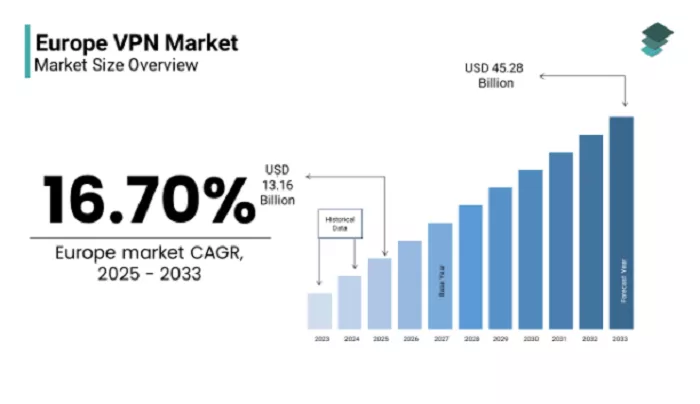The Virtual Private Network (VPN) market in Europe is growing rapidly, driven by rising digital activity, stronger data privacy regulations, and growing concerns over surveillance.
In 2024, the Europe VPN market was valued at USD 11.28 billion. It is expected to grow at a compound annual growth rate (CAGR) of 16.70% from 2025 to 2033, reaching USD 45.28 billion by the end of the forecast period, up from USD 13.16 billion in 2025.
VPNs allow users to browse the internet securely by encrypting data and masking IP addresses, offering protection from hackers, tracking, and surveillance. The rise in VPN adoption is closely tied to Europe’s increasing internet usage. According to Eurostat, internet penetration in the EU has reached nearly 92%, driven by a rise in remote work, online shopping, and digital media consumption.
This surge in online activity has boosted the need for secure internet connections, particularly among users handling sensitive personal or corporate data.
Regulatory frameworks have also played a major role. The General Data Protection Regulation (GDPR), enforced since 2018, has significantly raised public awareness about digital privacy. The European Data Protection Board (EDPB) notes that GDPR compliance is encouraging individuals and companies alike to use cybersecurity tools like VPNs to meet privacy standards and protect confidential information.
Rising geopolitical tensions have further increased interest in VPN usage. Concerns over state surveillance and policy restrictions have led more users to seek anonymous and unrestricted access to the web. The University of Oxford’s Internet Institute reported that searches for “best VPN services” in Europe spiked by more than 40% during times of political instability or when controversial laws were introduced.
As both personal and professional online activities expand, the demand for privacy-focused internet tools is expected to remain strong throughout the decade.


